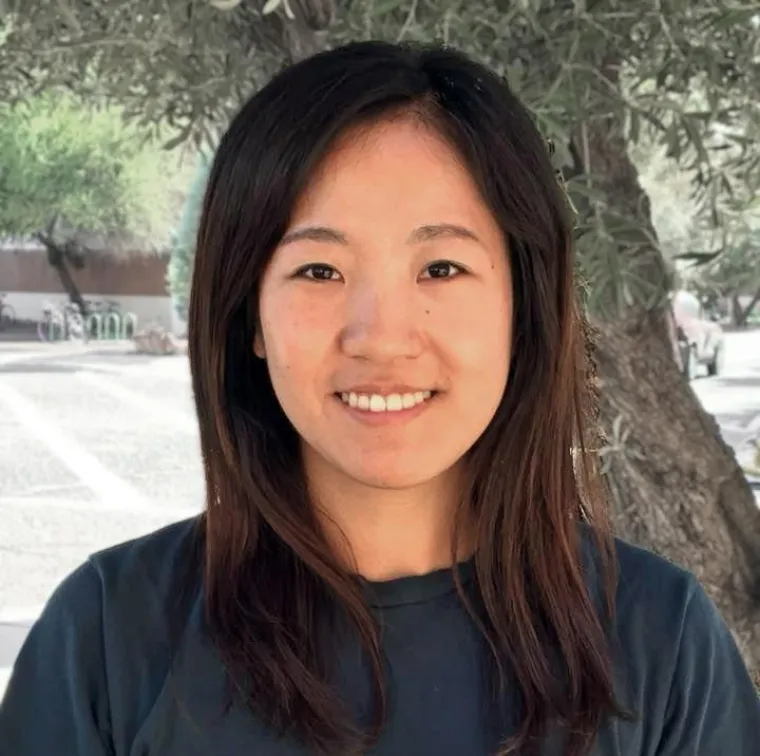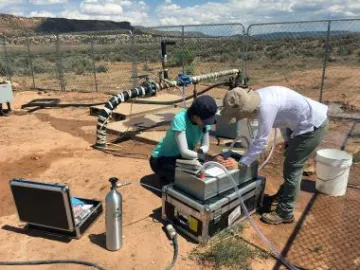Jihyun Kim

October 2021
A project as complex as understanding the history of the Paradox Basin requires a lot of interdisciplinary collaboration. Jihyun Kim, a fourth year PhD student at the University of Arizona, loves contributing to that goal.
Kim’s background while in South Korea was firmly grounded in geology, until her senior year when she participated in a summer internship program for the Mine Reclamation Corporation. The program allowed her to travel across Mongolia for three months, where she gained experience dealing with environmental problems caused by the development of mining. Little did she know that she’d be hooked.
Her newly found passion for environmentally focused sciences—geochemistry, to be specific—motivated her to seek a master's degree in groundwater hydrogeochemistry. There, Kim explored the ins and outs of shallow aquifer systems. Now, she’s continuing her studies with the UArizona Department of Hydrology and Atmospheric Sciences. “The PhD program in hydrology—this department—is very famous and a lot of the faculty here share my deep interests in things like fluid flow and water-rock interactions,” Kim says.
Kim was so impressed by the work being done at the UArizona that she decided to connect with her current advisor, Dr. Jennifer McIntosh, an established hydrogeologist who already had a lot of publications in Kim’s field of interest. “I contacted her and introduced my research. Then Jen shared her plan to do a huge new project, which is much larger scale than what I did in my master’s,” Kim says. “There are a lot of things to figure out, and that was fascinating to me.”
The Paradox Basin
McIntosh proposed a study of the hydrogeochemical evolutions of the fluid in the Paradox Basin, a massive evaporite basin covering large tracts of land in Utah, Colorado, Arizona, and New Mexico. For example, Kim would be looking into things like the distribution and sources of the fluids, as well as water-rock interactions and changes in fluid flow systems over time. “This research is based on the chemical and isotopic signature of water, natural gas data, and the geologic rock record. It’s very interdisciplinary and I really enjoy that,” Kim says.
Because the scope of the project is so broad, Kim is often working to interpret her data with scientists across many different areas, like structural geologists, geochronologists, and mineral ecologists. Together, they’re putting together a story about the water in the basin, some of which has been around for more than a million years. “The fluid is flowing through the subsurface and encountering other types of fluids. They can precipitate or dissolve some minerals, maybe from an ore deposit or mine. They can combine with hydrocarbons—oil and gas,” Kim says. “All these chemical and isotopic signatures, including the age of the fluid, tell us things about that water history.”
Getting Down to Business

Jihyun Kim (left) sampling groundwater for krypton isotopes
Kim has visited locations in the Paradox Basin to collect samples throughout the area at least half a dozen times and counting. According to Kim, the interdisciplinary aspects don’t stop with scientists. “Before we go to the field, we contact a lot of oil and gas companies to get assessed and reach the wells,” Kim says. “After that, we can go to the field to collect samples.” Sometimes, the companies don’t want to share their private information, so Kim and her colleagues have to approach other sources for access to field sites. Other times, companies are more than happy to allow researchers to take samples, and even share the data they themselves have collected.
Although she’s not sure what she wants to dive into next, Kim knows her heart will always lie with hydrogeochemistry. One possibility is the potential to learn more about up-and-coming modelling tools that may make her data analysis more efficient and more accurate. “Hydrology is very important for water management and mineral resources,” Kim says. “They’re very related to human life and understanding the system will help us understand everything from climate change to managing nuclear byproducts.”
Read more about the Paradox Basin project
Research Project Tackles Elephantine Paradox Basin Fluid-Rock System
Ancient Hydrology Informs Future Mining
Students trace the life of uranium, vanadium
In the news:
NSF Awards UArizona-Led Team $2.8M to Study Earth's Mysterious Subsurface

